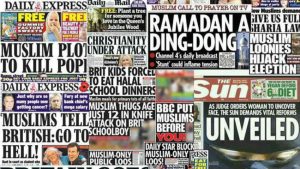
Staff Writer
Recent accusations by the UK’s former Transport Minister, Nusrat Ghani, that her reshuffle was influenced by her ‘Muslimness’, has reinvigorated the topic of Islamophobia in the UK, especially amongst the elite. A Conservative Party report, which was widely criticised for not going far enough, identified Islamophobia in the party, but spuriously asserted that it was not institutionalised. Meanwhile, a December 2021 report by the British Council of Muslims Centre for Media Monitoring concluded that over 60% of media coverage of Muslims was negative. The report assessed over 40 000 articles, and 5 000 video reports, from 34 media outlets, finding that 10% of articles contained pure misrepresentations of Islam, and that 20% of articles contained pure bias. Issues such as terrorism, Islam, and the Middle East were more likely to contain such when reported upon. In addition, this has not stopped with the Coronavirus coverage, with Muslim symbols often being misused, when in many times they did not even relate to the topic being covered.
Speaking to Radio Islam International, Amanda Morrison, Community Liaison Officer with the Centre for Media Monitoring, attributed much of this coverage to the background and context of editors and reporters,” If I draw a bigger picture for you, the media industry in the United Kingdom by and large, consists of people from the mainstream community, white people, people from quite privileged backgrounds, people who have gone to university, have gone to private schools and so on. Their knowledge of Islam, their knowledge of Muslims, their interaction with Muslim individuals is going to have been, and is such, when they see images of Muslim individuals, be they men or women, when they see images of Masajid and so on, they may be thinking, oh, let’s include this for the sake of diversity.”
The Centre for Media Monitoring, according to Morrison, has adopted both a proactive and reactive approach, maintaining channels where such coverage can be brought to their attention, but also organising workshops with editors, since many aren’t even aware of the problems and their prejudices and biases. However, the Coronavirus pandemic has slowed these down, especially since in-person methods are better equipped to deal with such.
Significantly in the UK context, editors of the Mirror and Sunday Times welcomed the 2021 report, accepting their roles in perpetuating these tropes and misrepresentations, but indicating their willingness to change.







0 Comments